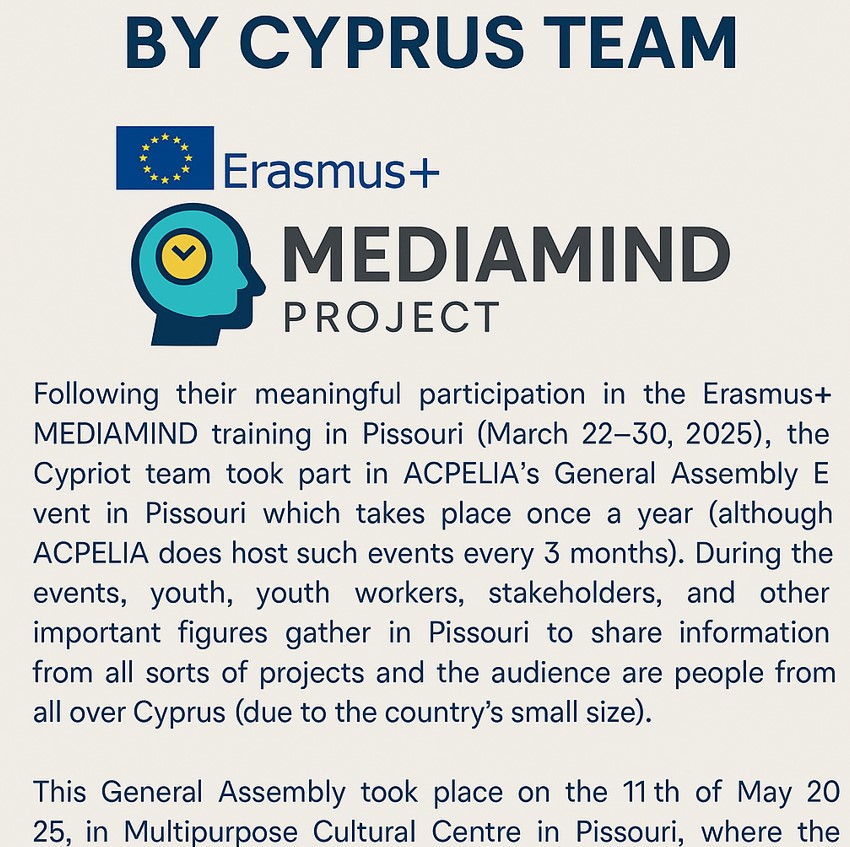Follow Up Cyprus
Follow-Up Activities by the Cyprus Team – MEDIAMIND Project
As a committed and dynamic contributor to the Erasmus+ project MEDIAMIND, the Cyprus team—coordinated by ACPELIA—played a pivotal role not only during the main training in Pissouri (March 22–30, 2025), but also in its impactful follow-up phase. ACPELIA's long-standing expertise in community mobilization and non-formal education became a catalyst for spreading the project's outcomes across Cyprus and engaging diverse audiences in meaningful reflection and dialogue around media literacy and digital well-being.
One of the most significant follow-up actions took place on May 11th, 2025, during the ACPELIA General Assembly—an inclusive and recurring event that gathers youth, youth workers, educators, stakeholders, and civil society members from across the island. Held at the Multipurpose Cultural Centre of Pissouri, the assembly provided an ideal platform for the Cypriot participants to showcase their experiences, knowledge gained, and the values promoted through the MEDIAMIND project. Their large-scale presentation reached a national audience, promoting not only the content of the training but also its practical implications in the fight against disinformation, digital overload, and media manipulation.
The follow-up did not stop there. Capitalizing on ACPELIA's strong online presence and creative communication strategies, the team carried out an extensive digital dissemination campaign. This included a series of engaging Instagram reels and posts, as well as Facebook updates and a general video presentation on YouTube. These materials amplified the reach of the project results, ensuring that the insights from the Cyprus team's involvement resonated with wider youth and community networks beyond the immediate project participants.
ACPELIA, which also designed and manages the official MEDIAMIND project website (https://mediamind.webnode.page/), ensured that the Cyprus team's follow-up efforts were both well-documented and accessible. This seamless integration of digital platforms and community outreach reflects the organization's commitment to sustainability, impact, and inclusive education through Erasmus+.
In conclusion, the Cyprus team's follow-up actions under the MEDIAMIND project illustrate the effectiveness of combining local engagement with digital storytelling. Through ACPELIA's coordination, these activities not only enhanced the visibility of the project but also contributed to a more critically aware and digitally resilient youth population in Cyprus.
Follow Up Activity
Following their meaningful participation in the Erasmus+ MEDIAMIND training in Pissouri (March 22–30, 2025), the Cypriot team took part in ACPELIA's General Assembly Event in Pissouri, which takes place once a year (although ACPELIA does host such events every 3 months). During these events, youth, youth workers, stakeholders, and other important figures gather in Pissouri to share information from all sorts of projects, and the audience is people from all over Cyprus (due to the country's small size).
This General Assembly took place on the 11th of May, 2025, in the Multipurpose Cultural Center in Pissouri, where the participants shared a large-scale presentation to youth in Cyprus about their experience in the project.
Posts
- https://www.instagram.com/p/DHrO6feNmIi/?img_index=1
- https://www.instagram.com/p/DHy5Z5CtS7L/?img_index=1
- https://www.facebook.com/Acpelia/posts/pfbid049WvMaqzhVMLJddfevCWhkdPY38puxFEALe7RLZah28BDTSFTmAJV24q1Veq81s8l
- https://www.facebook.com/Acpelia/posts/pfbid02C4xnLz7gvCkMzqJiWEmzA67uq4uCoSjDeft2n2GKvZezcTndVsDwppYnXKPr7mpJl
General video
Evaluation from our participants
Savvina Nikolaou
"Participating in the MEDIAMIND project was truly a transformative experience for me. As someone involved in youth work and community activities, I felt deeply connected to the project's mission of tackling digital overwhelm and promoting media awareness. The PDA in Pissouri helped me expand my knowledge on media literacy, and I was proud to contribute to the local dissemination through ACPELIA's General Assembly. Seeing young people engage with the content we presented gave me a strong sense of purpose. I now feel more confident in facilitating discussions about online behavior and critical thinking, and I'm inspired to integrate what I've learned into future initiatives."
Charalampos Nikolaou
"For me, the MEDIAMIND project was an opportunity to combine my passion for digital tools with meaningful youth work. I really enjoyed working behind the scenes, supporting the visual and technical aspects of our presentations and social media posts. The training helped me understand how important it is to use media responsibly—not only to share information, but also to inspire change. Being part of a project that emphasized mental well-being and critical media skills gave me new motivation to keep supporting such initiatives. It felt rewarding to be part of something so relevant and needed in today's world."

Posts
- https://www.instagram.com/p/DHrO6feNmIi/?img_index=1
- https://www.instagram.com/p/DHy5Z5CtS7L/?img_index=1
- https://www.facebook.com/Acpelia/posts/pfbid049WvMaqzhVMLJddfevCWhkdPY38puxFEALe7RLZah28BDTSFTmAJV24q1Veq81s8l
- https://www.facebook.com/Acpelia/posts/pfbid02C4xnLz7gvCkMzqJiWEmzA67uq4uCoSjDeft2n2GKvZezcTndVsDwppYnXKPr7mpJl
General video
Evaluation from our participants
Stavros Stavrinides
"As someone working in education, the MEDIAMIND project came at the perfect time. It gave me a fresh, practical perspective on how to approach media education with young people. The sessions in Pissouri were dynamic and engaging, and they made me reflect on how we consume and interact with media every day. I especially appreciated the emphasis on emotional well-being and mindfulness in the digital space. Sharing our work during the General Assembly was a proud moment—I felt like we were really bringing useful tools and reflections to our community. It was an excellent PDA that I will remember for a long time."
Michalis Chatzimarkou
"I went into the MEDIAMIND project with curiosity, and I left with inspiration. The project helped me explore creative ways to talk about serious issues like media manipulation, stress from digital overload, and online safety. I loved working on the dissemination—especially creating content that could speak to youth and make them think. What stood out to me most was how the project balanced practical skills with emotional awareness. It made me reflect not only on how I use media, but also how it affects my mindset. This experience gave me new tools, new confidence, and a new drive to stay involved in youth empowerment."

